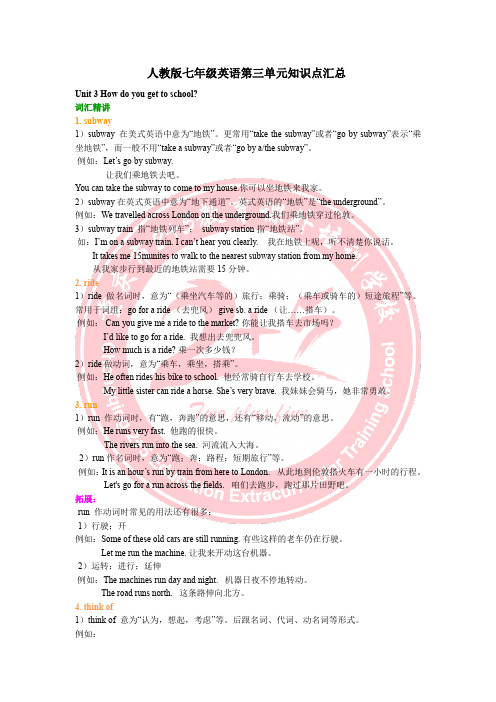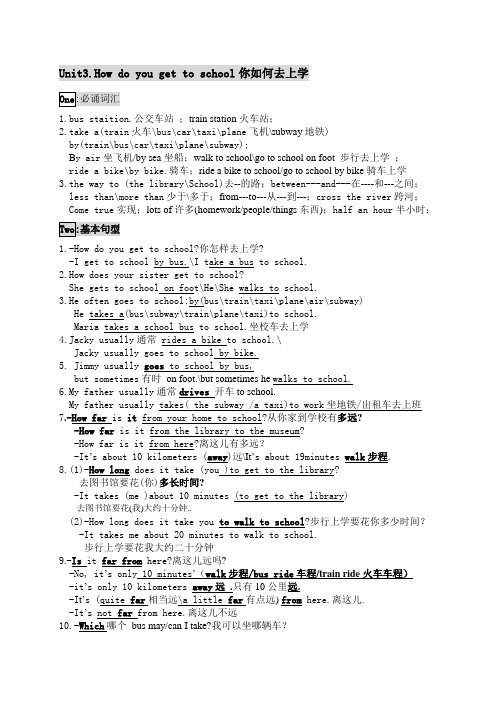新人教版七年级英语下册第三单元词汇、语法知识点
Unit3词汇精讲及短语人教版七年级英语下册

1.get to 到达例句:你怎么到学校?(G7下,U3,P13) How do you get to school?【注意】:当地点是副词home/here/there等时,to要省略。
例句:到家要多久?(G7下,U3,P15) How long does it take to get home?【扩展】:get to= arrive in/at或reach arrive at+小地点arrive in +大地点reach +地点(及物动词直接接地点)2.train/trem/cn.火车------复数trains短语:go to...by train=go to... on a/the train= take a/ the train to ...乘火车去……例句:你怎么去学校?How do you go to school?I take the train the school.=I go to school by train/ on the train3.bus Cn.公共汽车--------复数buses短语:go to...by bus=go to... on a/the bus= take a/ the bus to ...乘公交车去……例句:他坐公交车上班。
He takes the bus to work=He goes to work by bus/on the bus.例句:你的朋友们坐公交车上学吗?Do your friends go to school by bus?4. subway Cn. 地铁------复数subways例句:我骑自行车去地铁站。
短语:go to...by subway=go to... on the subwaytake the subway to...乘地铁去......例句:我们乘地铁去公园we take the subway to the park.=we go to the park by subway/on the subway.5.ride vt.骑cn.旅程------过去式rode 单三形式rides-----现在分词riding 骑手(cn.) rider短语:ride a /the /one’s bike(s) to== go to …by bike=go to… on a /the bike 骑直行车去……骑马ride a horse ==go ridingI ride my bike to school every morning .6.bike/bak/cn.自行车-----复数bikes短语:ride a bike 例句:你是走路还是骑自行车呢?Do you walk or ride a bike?7.sixty num.六十-----复数sixties ----序数词sixtieth8. Seventy num. 七十-----复数seventies -----序数词seventieth 9. eighty num.八十-----复数eighties -----序数词eightieth 10. ninety num. 九十----复数nineties----- 序数词ninetieth 11. hundred /'h ndr d/num. 一百【注意】:hundred 前有数字时,hundred 不用复数,直接接可数名词复数,也不与of 连例句:2000名学生在这个学校There are 2000 students in the school.【注意】表示一个不确定数时,前面没有具体数字,其后加s ,与of 连用。
+Unit+3+单元语法知识突破+2023-2024学年人教版七年级英语下册+

人教版英语七年级下册第三单元语法知识突破人教版英语各个单元主要是围绕话题,展开语法,接下来,我们就以人教版英语七年级下册第三单元为例,给大家总结一下。
1、关于疑问词how.(1)、疑问词how可以用于询问对方的感受。
例如:How are you?你好吗?回答,I'm fine, thank you. 我很好,谢谢。
又如:How is your weekend? 你的周末过得怎样?回答:It is great.很好。
(2)、疑问词how还可以用于询问方式,例如:How do you get to school? 你怎样去上学?回答:I take a bus to school. 我乘坐公共汽车去上学。
又如:How do you learn English well?你怎样把英语学好?回答:I read it every morning.我每天早上都在读。
(3)、how还可以用于引导感叹句,例如:How beautiful a girl she is! 多么漂亮的女孩啊!2、关于交通方式的表达。
(1)、动词短语:take a\\an\ the+交通工具名称。
例如:take the train乘火车;take a bus 乘坐公共汽车;take the subway乘地铁。
表示“骑”用ride,例如:ride a bike骑自行车;ride a horse骑马。
drive表示“开车”,例如:drive a car。
表达“走路”,用“walk”。
(2)、介词短语:by+交通工具名称。
例如by train乘火车;by bus乘坐公共汽车;by subway 乘地铁;by plane,乘坐飞机;by bike骑自行车。
特别提醒:“走路”用on foot。
练习巩固:改为同义句。
I usually take the school bus to school. = I usually go to school ________ ________.My cousin Jim walks to school. = My cousin Jim goes to school _______ _________.His father drives his car to work. = His father goes to work ______ ________.参考答案:(1)、by bus (2)、on foot (3)、by car注意:表达交通方式的句型结构如下:(1)、主语+表示交通方式的动词短语+to + 地点;例如:I take the plane to Beijing.我乘坐飞机去北京。
七年级英语下册第三单元

七年级英语下册第三单元知识点总结一、词汇与短语1. 动词- have:拥有,具有。
例如:I have a new book.(我有一本新书。
)- collect:收集。
例如:She collects stamps.(她收集邮票。
)- play:玩,演奏。
例如:I play the piano.(我弹钢琴。
)- show:展示,给……看。
例如:Can you show me your photos?(你能给我看看你的照片吗?)2. 名词- thing:事物,东西。
例如:What's that thing over there?(那边那个东西是什么?)- hobby:爱好。
例如:My hobby is reading.(我的爱好是阅读。
)- club:俱乐部。
例如:He is a member of the basketball club.(他是篮球俱乐部的成员。
)- story:故事。
例如:I like listening to stories.(我喜欢听故事。
)3. 其他- a lot of:许多,大量。
例如:She has a lot of friends.(她有很多朋友。
)- in one's free time:在某人的空闲时间。
例如:I often read books in my free time.(我经常在空闲时间读书。
)- be interested in:对……感兴趣。
例如:I'm interested in science.(我对科学感兴趣。
)二、语法与句型1. 一般现在时- 描述经常发生的动作或存在的状态。
例如:I usually go to school by bike.(我通常骑自行车上学。
)- 第三人称单数形式的变化:动词后加-s或-es。
例如:He watches TV every day.(他每天都看电视。
)2. 特殊疑问句- 结构:特殊疑问词+ 一般疑问句。
七年级下册英语第三单元知识点汇总

人教版七年级英语第三单元知识点汇总Unit3 How do you get to school?词汇精讲1. subway1)subway 在美式英语中意为“地铁”。
更常用“take the subway”或者“go by subway”表示“乘坐地铁”,而一般不用“take a subway”或者“go by a/the subway”。
例如:Let’s go by subway.让我们乘地铁去吧。
You can take the subway to come to my house.你可以坐地铁来我家。
2)subway在英式英语中意为“地下通道”。
英式英语的“地铁”是“the underground”。
例如:We travelled across London on the underground.我们乘地铁穿过伦敦。
3)subway train 指“地铁列车”;subway station指“地铁站”。
如:I’m on a subway train.I can’t hear you clearly. 我在地铁上呢,听不清楚你说话。
It takes me 15munites to walk to the nearest subway station from my home.从我家步行到最近的地铁站需要15分钟。
2. ride1)ride 做名词时,意为“(乘坐汽车等的)旅行;乘骑;(乘车或骑车的)短途旅程”等。
常用于词组:go for a ride(去兜风)give sb. a ride(让……搭车)。
例如:Can you give me a ride to the market?你能让我搭车去市场吗?I’d like to go for a ride. 我想出去兜兜风。
How much is a ride?乘一次多少钱?2)ride做动词,意为“乘车,乘坐,搭乘”。
例如:He often rides his bike to school. 他经常骑自行车去学校。
[全]人教版七年级英语下册unit3单词、知识梳理、词汇句型精讲
![[全]人教版七年级英语下册unit3单词、知识梳理、词汇句型精讲](https://img.taocdn.com/s3/m/423f4bb2f5335a8102d220e1.png)
人教版七年级英语下册unit3单词、知识梳理、词汇句型精讲Unit3 How do you get to school?1Unit 3单词(音标)train [tren] n.火车bus [bs] n.公共汽车;公交车subway ['sbwe] n.地铁take the subway 乘地铁ride [rad] v.骑n.旅程bike [ba k] n. 自行车ride a bike 骑自行车sixty ['skst] num.六十seventy ['sevnt] num.七十eighty ['et] num.八十ninety['nant] num.九十hundred ['hndrd] num.一百minute['mnt] n.分钟far [fɑ] adv. & adj. 远;远的kilometer ['kl,mit(r)] n.公里new [nju] adj. 新的;刚出现的every ['evr] adj. 每一;每个every day 每天by [ba] prep. (表示方式)乘(交通工具)by bike 骑自行车drive [drav] v. 开车car [kɑ] n.小汽车;轿车live[lv] v. 居住;生活stop [stɑ:p][stp] n. 车站;v. 停止think of 认为cross [krs] v.横过;越过river ['rv] n.河;江many ['men] adj. & pron.许多village ['vld] n.村庄;村镇between [b'twin] prep.介于…之间between…and…在……和……之间bridge [brd] n.桥boat [bt] n.小船ropeway ['rpwe] n.索道year [j] [ j] n.年;岁afraid ['fred] adj.害怕;惧怕like [lak] prep.像;leave [liv] v.离开dream [drim] n.梦想;睡梦v.做梦true [tru] adj.真的;符合事实的come true实现;成为现实Dave[deiv] 戴夫(男名2 Unit3 知识梳理◆短语归纳1. get to school 到达学校2. take the subway 乘地铁3. ride a bike 骑自行车4. how far 多远5. from home to school 从家到学校6. every day 每天7. take the bus 乘公共汽车8. by bike 骑自行车9. bus stop 公共汽车站10. think of 认为11. between…and…在…和…之间12. one 11-year-old boy 一个11岁的男孩13.play with…和…玩14. come true 实现15. have to 不得不◆用法集萃1. take…to…= go to…by…乘…去…2. How do/does sb get to…? 某人是怎样到…的?3. How far is it from…to…? 从…到…有多远?4. It takes sb. some time to do sth. 做某事花费某人多长时间。
人教版七年级英语下册第三单元知识点总结

人教版英语七年级下册第三单元知识点知识点讲解一、重点词组及短语:1. ________ ________ ________学校规章制度2. _______/ _______ _______ ________遵守规章制度;_______ ______ _______违反规章制度3. _______ _______ _______ ________ = _______ _______ _______ ________ 上课迟到4. _______ ________饭厅,餐厅5. _______ ________ 在课堂上6. _______ ________ 准时(_______ ________及时)7. _______ _______ _______ ________ 在教室里吃东西8.. _______ _______ _______ 戴帽子 9. _______ _______…听…10. ________ ________校服 11. ________ ________穿制服12. ________ ________ 我明白了 13. ________ ________do 不得不做14. _______/ _______ _______保持安静16. _______(_______)_______ 制订规则 18. _______ ______ _______在上学期间19. _______ ______ _______在校期间的晚上20. _______ _______ _______ = _______ _______ _______ ________练习弹钢琴[practice doing …练习做…]21. _______ ________外出 22. _______ ________看望朋友23. _______ _______ ________ = _______ _______ _______打扫房间24. _______ _______ ________ 洗餐具25. _______ _______ / _______ _______太多的(可数/不可数 )26. _______ _______ ________ = _______ _______ _______铺床27. _______ _______ ________ 去睡觉_______ _______ _______在床上28. _______ _______ (sb/sth/doing sth)考虑(某人/某物/做某事)29. _______ _______ _______ sb ________sth 对某人要求严格30. _______ _______ _______ ________学(做某事)31. _______ _______ _______ = _______ _______不要说话。
新人教版七年级英语下册Unit3词汇与句型

Unit3.How do you get to school你如何去上学1.bus staition.公交车站;train station火车站;2.take a(train火车\bus\car\taxi\plane飞机\subway地铁)by(train\bus\car\taxi\plane\subway);B y air坐飞机/by sea坐船;walk to school\go to school on foot 步行去上学;ride a bike\by bike.骑车;ride a bike to school/go to school by bike骑车上学3.the way to (the library\School)去--的路;between---and---在----和---之间;less than\more than少于\多于;from---to---从---到---;cross the river跨河;Come true实现;lots of许多(homework/people/things东西);half an hour半小时;1.-How do you get to school?你怎样去上学?-I get to school by bus.\I take a bus to school.2.How does your sister get to school?She gets to school on foot\He\She walks to school.3.He often goes to school:by(bus\train\taxi\plane\air\subway)He takes a(bus\subway\train\plane\taxi)to school.Maria takes a school bus to school.坐校车去上学4.Jacky usually通常 rides a bike to school.\Jacky usually goes to school by bike.5. Jimmy usually goes to school by bus,but sometimes有时on foot.\but sometimes he walks to school.6.My father usually通常drives 开车to school.My father usually takes( the subway /a taxi)to work坐地铁/出租车去上班7.-How far is it from your home to school?从你家到学校有多远?-How far is it from the library to the museum?-How far is it from here?离这儿有多远?-It’s about 10 kilometers (away)远\It’s about 19minutes walk步程.8.(1)-How long does it take (you )to get to the library?去图书馆要花(你)多长时间?-It takes (me )about 10 minutes (to get to the library)去图书馆要花(我)大约十分钟..(2)-How long does it take you to walk to school?步行上学要花你多少时间?-It takes me about 20 minutes to walk to school.步行上学要花我大约二十分钟9.-Is it far from here?离这儿远吗?-No, it’s only 10 minutes’(walk步程/bus ride车程/train ride火车车程)-it’s only 10 kilometers away远.只有10公里远.-I t’s (quite far相当远\a little far有点远) from here.离这儿.-It’s not far from here.离这儿不远10.-Which哪个bus may/can I take?我可以坐哪辆车?-You can take No.5 bus there.你可以做5路车去那儿。
人教版七年级下册英语第三单元知识点梳理

人教版七年级下册英语第三单元知识点梳理Unit 3 How do you go to school一、词汇与短语◆重点单词◆重点句子◆重点单词变形二、语法知识点A部分知识点1.与how构成的词组引导的特殊疑问句❶ how表示爱好、程度、看法等,意为“……怎么样?”。
eg:—How do you like the music?你觉得这首乐曲如何?—I like it very much.我非常喜欢它。
How is your Chinese?你的汉语如何?How do you like China?你认为中国怎么样?❷用于询问身体健康状况,意为“……怎么样?”。
eg:How do you do?你好!How are you?你(身体)好吗?❸ how提问交通方式。
其答语分三种情况:◆take a/the+表示交通工具的名词◆by +表示交通工具的单数名词◆on/in+限定词+表示交通工具的名词eg:How do you go to workevery day? 你每天怎样去上班?I take the subway to work. 我乘地铁去上班。
=I go to work by subway.=I go to work in the subway.❹表示感叹。
eg:How cold it is today!今天好冷啊!How hard they are working!他们在多么辛勤地劳动啊!How fast he runs!他跑得多快啊!❺表示某种方式、手段或方法。
eg:How do you spell it?你怎样拼写它?How did he go to schoolyesterday?他昨天是怎样去上学的?How do you know about it?你怎么知道这件事的?❻ how about用于询问或征询意见等,相当于what about,后接名词、代词或动词的-ing形式,意为“……怎么样?”。
- 1、下载文档前请自行甄别文档内容的完整性,平台不提供额外的编辑、内容补充、找答案等附加服务。
- 2、"仅部分预览"的文档,不可在线预览部分如存在完整性等问题,可反馈申请退款(可完整预览的文档不适用该条件!)。
- 3、如文档侵犯您的权益,请联系客服反馈,我们会尽快为您处理(人工客服工作时间:9:00-18:30)。
新人教版七年级英语下册第三单元词汇、语法知识点
词汇
stop n. & v./stop to do sth./stop doing sth.
I usually leave my home at about 8:00 and walk to the bus stop.
n. 车站;中途停留处
Our next stop will be York.
我们下一站是约克。
We’ll make a stop at the foot of the hill.
我们中途将在山脚下停留。
v. 停止,终止;作动词时,它的过去式为stopped,现在分词为stopping。
The noise suddenly stopped.
噪音戛然而止。
区分stop doing sth.和stop to do sth.
前者意为“停下正在做的事情”,而后者意为“停下(手头的事),开始做另一件事”。
I stopped talking and looked at him.
我不再说话了,只是看着他。
I stopped to tie my shoe.
我停下来系鞋带。
语法精讲
一. How引导的特殊疑问句How意为“怎样,如何”,是疑问副词,可引导特殊疑问句。
下面介绍How的几种用法
1)问身体健康或状况等。
How are you? 你好吗?
2)问天气状况。
How is the weather today? =What's the weather like today?今天天气怎么样? 答语:It's+描述天气的形容词sunny晴朗的、hot炎热的、rainy多雨的、windy多风的、cool凉爽的、cloudy多云的、cold寒冷的、snowy多雪的等等。
3)询问方式。
How does your mother go to work every day? 你妈妈每天怎么去上班?
4)询问程度。
How do you like this book? =What do you think of this book?你觉得这本书怎么样?
二.how far/ how long/ how soon/ how often/ how many/ how much/ how old/ how about
(1)how far意为“多远”,用来询问距离或路程的远近。
常用句型有:“How far is it from A to B?”
=“How far is B from A?”
意为“从A到B有多远?”
其回答为:
1)It's...meters/kilometers/miles (away).
2)It's about+数词+minutes' walk/ride/drive.
3)It's about+数词+minutes on foot/by bus.
(2)how long意为“多久”
1)用来对时间长短进行提问,指某个动作所持续时间的长短。
—How long does it take you to finish your homework every day?
你每天需要多久完成家庭作业?
—About two hours.大约两个小时。
2)how long还可对物品的长度进行提问,意为“多长”
—How long is the ruler?
这把尺子多长?
—It's about 20 centimeters.
大约20厘米。
(3)how soon意为“多久”,主要对一段时间进行提问,用于一般将来时中。
—How soon will you come back?
你多久会回来?
—In two weeks.
两个星期后。
(4)how often意为“多久一次”,表频率,用于一般现在时中。
句型:How often+do/does sb. do sth?某人多久做某事?
答语
a. 频率副词always总是、usually通常、
often经常、sometimes有时、never从不
b. 短语once a day/week/month/year一天/周/月/年一次等—How often do you go there?
你多久去那儿一次?
—Twice a week.
一星期两次。
(5)how many
how many对数量进行提问,后接可数名词复数。
How many flowers are there in the vase?
花瓶里有多少支花儿?
(6)how much
1)对数量进行提问,后接不可数名词
How much water is there in the bottle?
瓶子里有多少水?
2)对重量
how much意为“多少”。
-How much does the pig weigh?
-Eighty kilos.
-这头猪多重?
-八十公斤。
3)对价格提问
How much=what's the price of sth
—How much is your new computer?
=What's the price of your new computer?
你的新电脑多少钱?
—It's 5000 yuan.
4)对数字运算结果询问
-How much is 3 plus 3?
-Six.
-三加三是多少?
-六。
(7)how old
提问年龄,意为“多大年纪”
—How old are you?
你多大?
—I'm ten (years old).
我十岁。
(8)how about
用于提建议,意为“……怎么样”
how about =what about+名词/代词/动词的ing形式—How/What about going shopping?
去购物怎么样?
—Good idea.
好主意。
My coat is red, how about yours?
我的毛衣是红色的,你的呢?
三.扩展引导感叹句。
句型:
① How +形容词+ a/an +可数名词单数+(主语+谓语)!。
如:
How beautiful and lovely a girl she is!
她是个多么漂亮和可爱的姑娘啊!
How interesting an artist he is!
他是个多么有趣的艺术家啊!
② How +形容词 / 副词+主语+谓语。
如:
How good she is! 她多么漂亮啊!
How slow he runs! 他跑得多慢啊!
③How +主语+谓语!。
如:
How time flies! 光阴似箭!
注意:由 what 引导的感叹句与由 how 引导的感叹句有时可以转换How beautiful and lovely a girl she is!
= What a beautiful and lovely girl she is!
多么美丽和可爱的女孩啊!
What sweet candies these are!
= How sweet these candies are!
多么甜的糖果啊!
四by,in,on
均有“乘,坐”的意思,但用法不同。
by表示乘坐某种交通工具时,交通工具名词用单数,且前面不能用冠词,也不能加任何修词。
例:
by plane;by bike
in表示乘坐某种交通工具时,交通工具名词前通常用冠词或者物主代词修饰,in侧重于里面。
例:
in a car;in a taxi
on表示乘坐某种交通工具时,交通工具名词前通常也用冠词或者物主代词修饰,on侧重于平面。
例:
on a plane;on a bike
on foot意为“步行”。
